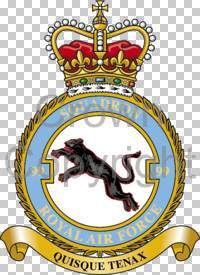No 99 Squadron, Royal Air Force: Difference between revisions
Jump to navigation
Jump to search
No edit summary |
No edit summary |
||
| Line 12: | Line 12: | ||
===Origin/meaning=== | ===Origin/meaning=== | ||
The Squadron was at one time using aircraft equipped with Puma Engines. The Puma also illustrate independence and tenacity of purpose during the daylight raids into Germany during World War I.<br> | The Squadron was at one time using aircraft equipped with Puma Engines. The Puma also illustrate independence and tenacity of purpose during the daylight raids into Germany during World War I.<br> | ||
The Motto translates as "Each tenacious". The Badge was | The Motto translates as "Each tenacious". The Badge was granted in July 1937. | ||
{{media}} | {{media}} | ||
| Line 18: | Line 18: | ||
[[Category:Military heraldry of the United Kingdom]] | [[Category:Military heraldry of the United Kingdom]] | ||
[[Category:Air Force heraldry]] | [[Category:Air Force heraldry]] | ||
[[Category:Granted 1937]] | |||
Revision as of 12:12, 16 July 2020
| Heraldry of the World |
| British heraldry portal Civic heraldry of the United Kingdom |
|
NO 99 SQUADRON, ROYAL AIR FORCE
History: Formed at Yatesbury in August 1917.
Official blazon
A puma salient sable
Origin/meaning
The Squadron was at one time using aircraft equipped with Puma Engines. The Puma also illustrate independence and tenacity of purpose during the daylight raids into Germany during World War I.
The Motto translates as "Each tenacious". The Badge was granted in July 1937.
Contact and Support
Partners:
Your logo here ?
Contact us
© since 1995, Heraldry of the World, Ralf Hartemink 
Index of the site
Literature: Image from Defence Brand Portal, Ministry of Defence












